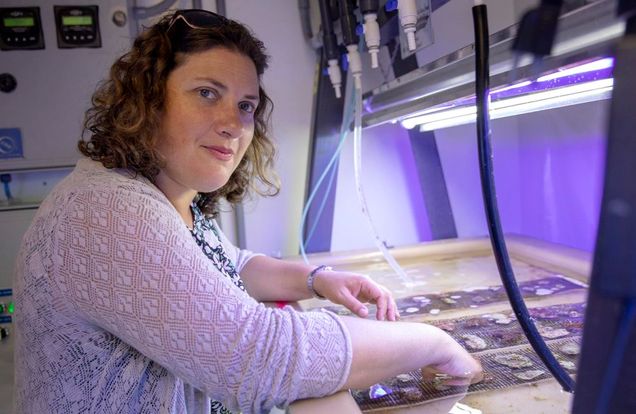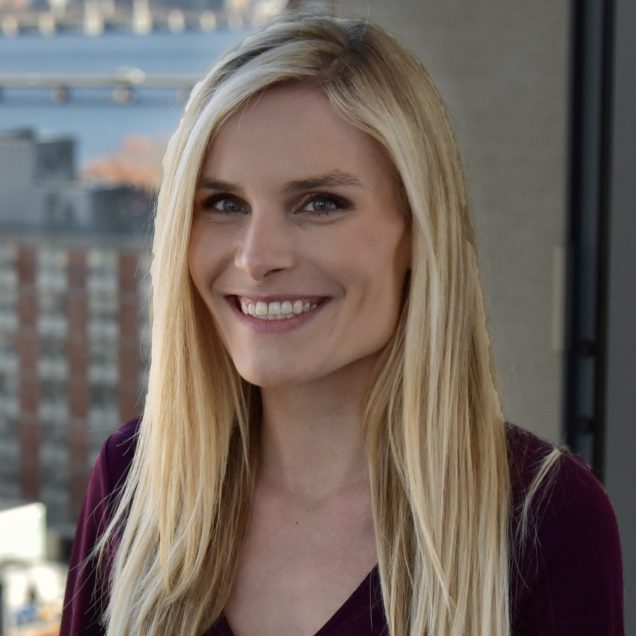Leah Williams Gives Talk at EMBO | EMBL Symposium

Leah Williams of the Gilmore Lab gave an invited talk at EMBO | EMBL Symposium: The Organism and its Environment, held at EMBL Heidelberg, Germany from March 1-4, 2020. The title of her talk was "Evolution of immune regulation: structure, activity, and biology of transcription factor NF-kappaB in early metazoans."
Leah's research explores the evolutionary origins and molecular mechanisms of immunity in basal marine organisms such as corals and sponges. Her research has been supported by an NSF Graduate Research Fellowship and the National Science Foundation.
Julie Jung’s Paper Shortlisted for 2019 Journal of Experimental Biology Outstanding Paper Prize

Julie Jung of the Warkentin Lab recently received recognition for "How do red-eyed treefrog embryos sense motion in predator attacks? Assessing the role of vestibular mechanoreception." The paper was shortlisted for the 2019 Journal of Experimental Biology Outstanding Paper Prize, and was described as a "fascinating finding, [with] carefully planned experiments and very well written up."
Read more about why the paper was chosen here. Congratulations, Julie!
Jenna Rindy Receives Deland Award

Jenna Rindy of the Templer Lab was recently awarded a $10,000 Deland Award from the Arnold Arboretum of Harvard University. The award supports investigations by graduate and advanced undergraduate students working on the comparative biology of woody plants, including developmental biology, physiology, genetics, reproductive biology, or ecology. Jenna is interested in researching the effects of anthropogenic pollutants on urban forestry and human populations in urban areas. In particular, she plans to investigate how PM2.5 deposition causes damage to urban tree leaves, and how living nearer to urban forest systems affects human health.
Congratulations, Jenna!
Professor Rotjan Featured in Lab Animal Article

Professor Randi Rotjan was featured prominently in "The quest for an animal model of coral health and disease," an article in the January 27 issue of Lab Animal, a Nature research journal. The article describes how the temperate coral Astrangia poculata is being studied alongside the anemone Aiptasia as an important and emerging model system to studying corals. Rotjan is co-leading a growing group of researchers interested in this model coral. Research conducted by BU graduate students, including a Dynamic Energy Budget model by Caroline Fleming, is also referenced in the article.
Rotjan, along with Professors Finnerty, Davies, and Kaufman, have been pioneering work with this coral with BU Biology and BU Marine Program graduate and undergraduate students. Read the full article here.
Ashley Comer, Dr. Tushare Jinadasa, & Dr. Alberto Cruz-Martín Published in PLOS Biology

GPN PhD student Ashley Comer and Biology Postdoctoral Fellow Dr. Tushare Jinadasa in Alberto Cruz-Martín's Lab recently co-authored an article published in PLOS Biology, "Increased expression of schizophrenia-associated gene C4 leads to hypoconnectivity of prefrontal cortex and reduced social interaction." The article was featured on the January 2020 cover.
Schizophrenia is a debilitating psychiatric disorder characterized by hallucinations, emotional withdrawal and a decline in cognitive function. Comer, Jinadasa and colleagues have found that a highly-associated schizophrenia gene, complement component 4 (C4), plays a direct role in the pathogenesis of disease-relevant phenotypes. Increased expression of the immune gene C4 leads to reduced connectivity of neurons in the medial prefrontal cortex, a brain region with notable gray matter loss in schizophrenia. This disruption in the development of the frontal circuits caused deficits in the social behavior of young mice that persisted into adulthood. Taken together, this finding is important because it reveals a critical window in the development of the prefrontal cortex in which C4 could be therapeutically targeted to alter phenotypes in schizophrenia.
Read the article here.
Heather Hook Recipient of Inaugural Kilachand Doctoral Fellowship

Heather Hook of the Siggers Lab is a recipient of the inaugural Kilachand Doctoral Fellowship. This fellowship is funded by the Multicellular Design Program (MDP), which combines research in Synthetic Biology, Microbial Engineering, Tissue Engineering, Data Science, and Biophysics to understand the design principles of multicellular systems.
Heather’s research is focused on developing a new high-throughput technique, termed CASCADE (Comprehensive Assessment of Complex Assembly at DNA Elements), to precisely profile the effects of single nucleotide variants on the indirect recruitment of transcriptional cofactors to DNA across different cell types and stimulus conditions. Using macrophage nuclear extracts, CASCADE has been used to map the determinants of constitutive and stimulus-dependent recruitment of cofactors to various enhancers and promoters of immune response genes. Furthermore, CASCADE has been used to characterize defective cofactor recruitment at known stimulus dependent GWAS single nucleotide variants (SNPs) implicated in immune diseases.
CASCADE will be used for Heather’s collaborative research project with the Mostoslavsksy lab of the Center of the Regenerative Medicine for her MDP fellowship. The goal of the project is to use CASCADE to identify transcriptional regulators controlling cell fate. Heather plans on following the development of induced pluripotent stem cells (iPSCs) to specific immune cells to identify transcriptional regulatory complexes governing developmental decisions. This work will help establish a new approach to understand and manipulate cellular fates that can be then be applied to more complex cellular differentiation systems.
Congratualtions, Heather!
Fall Semester GSO Travel Grant Winners
Congratulations to Brandon Güell (Warkentin Lab) and Natalie Vaisman (Frydman Lab) for being recipients of Fall 2019 Graduate Student Organization (GSO) Travel Grants! They are two of just ten winners.
Brandon Güell Earns Second Place in American Institute of Biological Sciences Photo Contest

Brandon Güell of the Warkentin Lab recently won second place in the American Institute of Biological Sciences 2019 Faces of Biology Photo Contest. The contest photos are used to help the public and policymakers better understand the value of biological research and education. Read the full announcement here.
Congratulations, Brandon!
Ashley Comer Receives 2019 I. Alden Macchi Award

GPN PhD student Ashley Comer of the Cruz-Martin Lab was selected as the winner of the 2019 I. Alden Macchi Award for excellence in the field of regulatory biology.
Ashley's research is focused on understanding how the immune and nervous system interact to shape brain development and behavior in healthy and diseased states. As part of her thesis research project, Ashley has sought to understand the role of a schizophrenia-associated gene called Complement component 4 (C4). Specifically she studies the impact of increased C4 expression on the wiring of the prefrontal cortex, a brain region implicated in social cognition, by assaying neuronal connectivity during early postnatal development. She has found that increased C4 expression disrupts synaptic development of the prefrontal cortex through microglia-mediated synapse elimination which leads to deficits in the social behavior of mice.
Congratulations, Ashley!
Laura DiRoberts Receives Inaugural Denton Award

Laura DiRoberts of the Rotjan Lab was selected as the inaugural winner of the Denton Award for her master's research thesis in biology titled "Nitrogen Cycling in the Temperate Northern Star Coral, Astrangia poculata: Distinguishing Autotrophic from Heterotrophic Nutrient Contributions." This award is given for excellence in scholarship and research accomplishment during a master's thesis in the Department of Biology.
Laura has a BA in Marine Biology from Salem State University and a BS in Environmental Science from the University of Saint Joseph. Prior to coming to BU, Laura interned at the Ocean Alliance in Gloucester, MA on the SnotBot project. She recently won "Best Talk" at the Astrangia Research Workshop at Roger Williams University in Bristol, Rhode Island.
Congratulations, Laura!